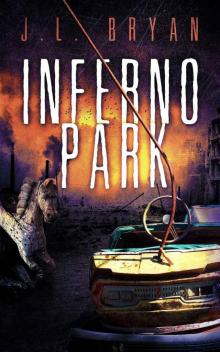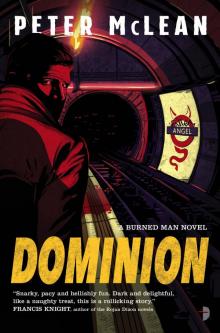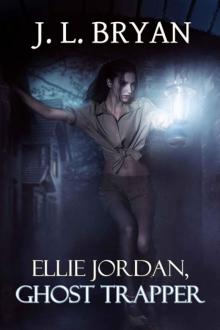Dominion Read online
Page 5
Gorski had, in a distant youth, been a journalist active in the Polish Solidarity movement, then written a Pulitzer-nominated book on the history of nonviolent resistance. He disappeared halfway through the spring semester of 2021. Another teacher took his place, without explanation, and when Ruppert asked where Dr. Gorski had gone, the new teacher scowled at him and shook his head. Ruppert tried to research the new teacher, but had been unable to find any information on the man’s background. He’d certainly never worked as a journalist.
Ruppert slowed as he approached his neighborhood gate. The road in this part of Bel Air was a paved channel between two thirty-foot walls, each occasionally punctuated by one of the large gates. The brass grill of the gate slid aside for his car.
“Daniel.” Madeline’s voice was unusually soft. She seemed to be making eye contact with herself in the mirror, as if trying to look into her own soul. Daniel knew how she felt.
“What is it?”
She touched her pinkie finger to the corner of her mouth. “Do you think I’m getting a zit here? It looks like there might be a zit.”
Daniel turned off the street into his driveway, then looked at her for a long time. She turned toward him, stretched her mouth into a vertical oval, and poked at the corner of her mouth again.
“See it?” she asked.
“No. I think it’s fine.”
“Good.” The car door opened for her, and she gathered her purse and climbed out. “I’d hate to start the week that way.”
SEVEN
Ruppert and Sully spoke very little to each other after Sully’s panicked visit, and they never had lunch together again. Ruppert busied himself trying to patch up his image with his fellow churchgoers. Not only did he attend Revelation Review on Tuesday night, but he arranged to meet a few of the men for lunch the following day, including Liam O’Shea, who accepted the invitation with his usual rubbery, toothy smile. Ruppert spent most of the lunch poking at dry, flavorless slices of grilled chicken on top of a limp salad and feigning interest in O’Shea’s drooling pedantry.
“We have to stay vigilant, you know,” O’Shea said. Ranch dressing dribbled from his lower lip. “You’d be surprised how many families are still raising their children with incorrect beliefs and antisocial values.”
“And your job is to fix that?” Ruppert asked. O’Shea, it turned out, was an analyst for Child and Family Services, a federal program contracted out to Pastor John and Golden Tabernacle. A bureaucrat, as Ruppert had thought.
“We have a hundred-point system to evaluate the morals of parents,” O’Shea said. “It’s very scientific. A score of sixty or below indicates a social crisis, and we get those kids to a Child Salvation Center immediately. It’s important to grab them as young as you can, before their parents corrupt them beyond repair.”
“And what happens to the parents?” Ruppert asked. The question drew sharp glares from the other two men at the table.
“We report them to Terror.” O’Shea shrugged, dipped his thick hamburger into the cup of ranch dressing he’d ordered for just that purpose, and bit off a mouthful. The process of chewing didn’t stop him from speaking; O’Shea was an efficient one. “We’re focused on protecting children, not prosecuting terrorists. You know, we save thousands of young souls in California every year, but it’s never enough. You can’t help but worry about all the children that go unsaved these days, with Judgment Day so close at hand. I wish I could just get my hands on all of them.”
Ruppert nodded solemnly and signaled their waiter for the check.
Sully did not show up to work on Thursday morning, and the producers scrambled to bring in the weekend sports reporter to cover his slot. No one mentioned why Sully was absent, and nobody asked, so Ruppert assumed the man hadn’t simply called in sick.
He tried twice to call Sully from the screen in his office, but the screen spat back that the system had no record of any such person. This was a warning universally understood—look no further, the person you’re trying to reach has been deleted from the official universe.
Ruppert’s top news story concerned the new radical Egyptian cleric, Muhammad al Taba, and his alleged hordes of North African followers. The cleric was finally being introduced to the nation at large, a shiny new enemy to hate, and Ruppert was doing his part. War news often arrived in this fashion, first released by select religious authorities, then confirmed by news reports days or weeks later. It reinforced the faithful’s confidence in the wisdom and infallibility of the Dominionist preachers. What Ruppert didn’t understand was how the preachers got such important, still-classified intelligence ahead of everyone else.
After work, Ruppert wanted to visit his storage unit in south L.A. and get online—he’d earned it, after two consecutive days with O’Shea and his ilk—but instead he made an even less cautious decision and drove east into Silverlake.
Sully lived in a neighborhood of large, decaying old houses with yards of sand and weeds, some of them only burned-out hulls. Silverlake was not a walled community, and literally anyone could walk right up to Sully’s door or window. After four years in Bel Air with Madeline, this seemed to Ruppert like a dangerously exposed way to live.
Sully’s house stood at the top of a hill, an old Victorian with tall, narrow windows and sharply peaked roofs, ancient by California standards. The lawn was patchy here, too, as if Sully wanted to respect the neighborhood’s low standards, but in place of the coarse weeds choking up the other yards, Sully had only desert wildflowers and thick palm trees within the iron fence encircling his property.
Ruppert parked on the street in front of the house and approached the iron gate. He couldn’t see any sign of a callbox, so he lifted the hand latch, opened the gate, and walked up the front steps.
The only sound in the neighborhood was the rush of highway traffic in the distance. He saw one person, a black man with a long gray beard, sitting on broken porch steps across the street from Sully’s house. He smoked a hand-rolled cigarette and read a crumbling paperback, and paid no attention to Ruppert. One corner of his house’s roof was cratered in, and bits of what might have been a second-floor balcony still dangled from the wrecked area.
Ruppert turned to look at the black lens over Sully’s door. “Sully, are you here? Sully?”
No response. He rapped the antique door knocker, and the door crept inward. He nudged it open further. A wide vertical crack split the doorjamb, and there was only a gaping, splintered hole where the notch for the deadbolt should have been.
Ruppert pushed the door open all the way. The front hall of Sully’s house was demolished, as if an earthquake and hurricane had hit at the same time. Side tables were overturned and broken apart, pictures had been ripped from the walls, and the walls themselves were punctured in more than a dozen places.
“Sully?” Ruppert moved down the hall, looking into a parlor, the kitchen, the dining room, the small library at the back of the first floor. Everything was broken open, upholstery ripped out of furniture, appliances smashed apart, bookshelves overturned. Only Sully’s screens had not been touched, even the floor-to-ceiling in his living room. All of them glowed the vapid blue color indicating your net connection was broken.
Ruppert climbed the narrow spiral staircase at the back of the house and into the upstairs hall. He looked into Sully’s office, the guest bedroom, the bathroom. All had been ravaged, and even the claw-footed bathtub was overturned and broken into large pieces. The bathroom sink was full of shattered glass and bright pills from the medicine cabinet.
Every nerve ending in Ruppert’s body told him to get out, run to his car and drive away, never to think of Sullivan Stone again, but he didn’t. There was one more room to check.
One of the double doors to the master bedroom stood slightly ajar, revealing nothing about the lightless room beyond. Ruppert pushed them both open with trembling hands.
Wooden shudders blocked off the windows, but streaks of late-afternoon sunlight fell into the room between the sla
ts. The only other source of light was the square of idiot blue from a small screen across from the curtained bed.
The bedroom had been destroyed, as he expected by now, the furniture gutted, the drawers yanked from the dresser and flung across the room. He avoided the curtained bed, looking first into the master bathroom to see a thousand fragments of shower stall door littering the tile, then into the closet, which was nearly as large as the bedroom itself. Dozens of shoes were spilled on the floor, and the hundred or so stylish coats and jackets had been slashed open.
He returned to the bed, took a breath, and pulled back a handful of sliced curtain.
The mattress, too, had been gutted, and the pillows ripped apart. The memory of the Han family flared behind his eyes, as it often did, and he squeezed them shut for a long moment before he could look again. Sully’s body, which he’d half-expected to see, was not there. He did notice a dark stain on the inner face of one of the bed’s four posters. Looking closer, he could see it was a wide stamp of dried blood with a few blond hairs clinging to it. That was the only sign of Sully.
He let the curtain drop, momentarily relieved he hadn’t confronted Sully’s dead body, but he knew it meant worse things for Sully. If he was still alive, it meant long hours of interrogation, beatings in dark rooms, nights of torture…it meant Terror. The awareness of Terror was the submerged iceberg in the American consciousness. The Department of Terror was the full and final backstop against dissent, against unpatriotic attitudes, against moral deviance.
No one wanted to think about Terror, but fortunately you didn’t have to. You just had to wave the flag harder than everyone else, pray louder than everyone else, recite the Pledge of Allegiance every morning with greater solemnity than your co-workers. You just had to adapt to the safe alternative to reality that they offered you. You just had to express your full faith and belief in whatever the latest version of the truth might happen to be, and commit yourself fully to it, and forget all about it when the story changed. In Madeline’s school, they called this “well-adjusted.” More than anything else, her job was to adjust children.
For the maladjusted, there was Terror.
Ruppert stepped away from the bed and turned toward the screen. The house’s security system should have recorded what happened. It should have contacted the police, too; the fact that it hadn’t meant it was not criminals who did this, but authorities.
“Restart home network,” Ruppert said.
The screen did not change. It didn’t even flicker.
“Hello? House, answer me.”
Nothing.
It suddenly occurred to Ruppert just how he might look to Terror, should they choose to look in on Sully’s house, or to review the records later. It was possible that the cameras weren’t functioning, either, but he doubted it. More likely, they’d wiped the network’s memory but would want to keep an eye on anybody who came to visit their latest target. Sully had been involved in something, or why would they have searched his house so thoroughly? It was not the kind of disappearance you associated with simple social deviants.
Whatever crimes they suspected of Sully, Ruppert was now unavoidably a person of interest. It was possible they would dismiss him because he was a co-worker and might have been concerned about Sully, and if not, Ruppert would certainly make that defense when they came for him. Ruppert was a God-fearing Dominionist, a Party member and regular donor, a public man. He’d erected every possible bulwark against Terror, doing his best to protect himself and his wife from their power. He hoped it counted now. Still, he should have known better than to check up on a disappeared friend.
Ruppert left the bedroom and hurried down the front stairs.
“Stop there!” a man’s voice yelled from behind him. Ruppert felt a chill pass down the length of his spine. He raised both his hands, fingers wide.
“Turn this way.”
Ruppert obeyed. He tried to not exhale a sigh of relief when he saw that he was facing two cops in black uniforms. The Hartwell Police logo was stamped on their shoulders, an “H” with a hollow heart at the center of the crossbar, a smaller “W” tucked into the lower bracket of the “H.” Like most large cities on the West Coast, Los Angeles had contracted its police services out to Hartwell Civil Defense, Inc. These amounted to local cops. They were still dangerous, of course—he didn’t want to offend them by looking relieved, but he’d expected Terror men in black coats.
“This your house?” one of the cops asked. He was short and pudgy, with a bristly mustache. He glanced at a thin screen in his hand. “Says it’s not your house.”
“No. This is where my…a co-worker of mine lives. Used to live.”
“Looks like he moved out,” the other cop said.
“Yeah,” Ruppert said. “I thought he was at home sick. I guess I got some bad information.”
“I guess you did,” the pudgy cop said.
“Looks to me like he moved out,” Ruppert said, his words moving a bit too fast. “He might have moved to another city and just didn’t tell anyone. He’s a…well, you know these TV types, and anyway maybe we’re better off he’s gone, he could have been a deviant or a criminal for all we know, you never know, I mean you have to stay vigilant about these things.”
“You do have to stay vigilant,” the second cop agreed.
“After Columbus, you really can’t trust anybody except God and the president.”
The two cops nodded solemnly. Then the pudgy one broke into a smile. Ruppert knew what that meant, and it relaxed him further.
“Hey! You’re that reporter guy, right? My wife watches you every day, right after that talk show with the three angry fat ladies.”
“Thanks,” Ruppert said. “Tell your wife I said thanks for watching.”
“Wow, the reporter guy,” the pudgy cop continued. “So, hey, what’s the news today?”
“The war’s on in Egypt again. Can I help you with anything else?”
“We got a report of a suspicious character. You seen anybody like that?”
“It is a bad neighborhood,” Ruppert said. “I thought somebody I used to know lived in this house, but I guess he’s moved. Can’t blame him with a neighborhood like this.”
“Can’t blame him at all,” the second cop said.
“All right,” Ruppert said. “Thank you both so much for your admirable public service in these difficult times.”
“We’d better escort you to your vehicle, sir,” the second cop said. “It is a dangerous neighborhood.”
“I’d appreciate that very much.”
They both walked close behind Ruppert all the way to the curb. He guessed that if he’d stopped walking, they would have pushed him to his car.
The cops hovered over him as he sat down in the driver’s seat and the car door closed. He thanked them both again and then drove west, shivering hard and barely able to concentrate on the road. He checked his rearview mirror the whole way home, but nobody seemed to be following him.
EIGHT
After Sully disappeared, Ruppert took great pains to keep his life unremarkable. He joined another group at church, the Dune Buggers for Christ, which involved building machines from kits and driving them around a church-owned park in the desert (but only as a large and supervised group, of course). He liked it because it meant hours of time at the church workshop, working with his hands—it was more enjoyable and more honest than the Revelation study group, focusing on electrical and mechanical systems, on undeniable reality instead of ideology.
He did not miss a single Revelation class, though, and he spent more time at the church golf course and working out in the church gym. He expressed maximum groupiness at every turn, smiling and slapping hands with anyone he vaguely recognized.
He lay awake many nights waiting for someone to kick in his front door, or at least come to question him, but as far as he could tell, his mistaken visit to Sully’s house brought no consequences. It was always possible they were monitoring him closely. He would never kn
ow the difference until it was too late.
Sometimes he looked at the sleeping form of his wife and wondered how he had come to this place, sleeping next to this person who existed in a different universe from his own, a universe that could be reordered from top to bottom at the proper signal. He’d been fifteen when Columbus happened, and much of his life since then felt like a dazed sleepwalk. His private questions, too dangerous to be asked, targeted the larger truths about the world, about why his country seemed bent on ruling the planet, how they got away with claiming morality while they rained death on millions around the world, how they managed to claim his county was free and democratic when ten or fifteen or twenty million people were incarcerated, depending on what numbers you saw, and there was only one ideology represented on the ballot.
He puzzled over the mass behavior of humanity, but drifted like a zombie through his own life. He’d wanted to work as a print journalist, the kind who took long research trips and studied problems in the most troubled parts of the world. By the time he graduated college, those jobs had become not only scarce, but dangerous—writers kept disappearing without explanation, as had much of the faculty at Berkeley. Newsgathering in foreign countries was limited to military and intelligence personnel for national security reasons.
He’d wisely joined the Dominionist church, a denomination that had spread quickly through the nation after Columbus and become more or less a requirement for those who wanted to participate in public life. Contacts at the church had gotten him his first internship with GlobeNet, and he’d worked there ever since.
He met Madeline as a “suggested match” from the church’s Unmarried Young Adult ministry. Membership in that group was automatic for anyone who fit the description. The counselors would set you up on dates whether you asked them to or not. Madeline had been the fifth woman Ruppert met in this way, but they’d all been very similar, from well-heeled conservative families, all of them employed in some branch of the sort of social-service work the church deemed proper for females.

 Ghost Trapper 12 The Necromancer's Library
Ghost Trapper 12 The Necromancer's Library Ghost Trapper 14 Midnight Movie
Ghost Trapper 14 Midnight Movie_preview.jpg) Fairy Metal Thunder (Songs of Magic, Book 1)
Fairy Metal Thunder (Songs of Magic, Book 1) Ghost Trapper 13 The Trailwalker
Ghost Trapper 13 The Trailwalker Inferno Park
Inferno Park Dominion
Dominion Nomad
Nomad The Tower (Ellie Jordan, Ghost Trapper Book 9)
The Tower (Ellie Jordan, Ghost Trapper Book 9) Jenny Pox (The Paranormals, Book 1)
Jenny Pox (The Paranormals, Book 1) Tommy Nightmare (Jenny Pox #2)
Tommy Nightmare (Jenny Pox #2) Cold Shadows (Ellie Jordan, Ghost Trapper Book 2)
Cold Shadows (Ellie Jordan, Ghost Trapper Book 2) Alexander Death (The Paranormals, Book 3)
Alexander Death (The Paranormals, Book 3) Ellie Jordan, Ghost Trapper
Ellie Jordan, Ghost Trapper Lullaby (Ellie Jordan, Ghost Trapper Book 7)
Lullaby (Ellie Jordan, Ghost Trapper Book 7) EJ06 - Maze of Souls
EJ06 - Maze of Souls Fairy Metal Thunder (Songs of Magic, #1)
Fairy Metal Thunder (Songs of Magic, #1) House of Whispers (Ellie Jordan, Ghost Trapper Book 5)
House of Whispers (Ellie Jordan, Ghost Trapper Book 5) Terminal (Ellie Jordan, Ghost Trapper Book 4)
Terminal (Ellie Jordan, Ghost Trapper Book 4) Jenny Pox
Jenny Pox The Crawling Darkness (Ellie Jordan, Ghost Trapper Book 3)
The Crawling Darkness (Ellie Jordan, Ghost Trapper Book 3) The Keeper (Ellie Jordan, Ghost Trapper Book 8)
The Keeper (Ellie Jordan, Ghost Trapper Book 8)